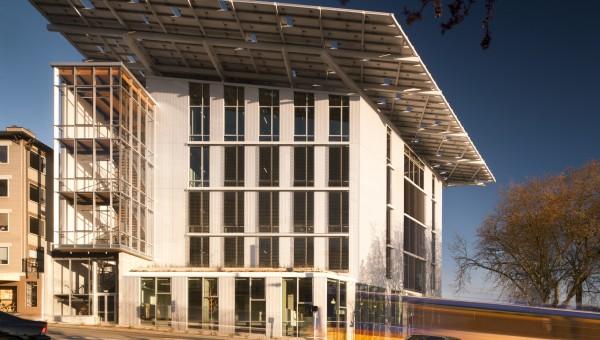The Bullitt Center in Seattle, which some say is the world's "most efficient" office building is not only influencing how other structures are built, it is contributing to revisions of codes and public policy.
The building’s design was made possible by Seattle’s Deep Green Pilot Program that allows builders to deviate from standard codes to build more sustainably. For example, the building was allowed to add two to three feet to the height of each floor to allow more daylighting. Neighbors objected to the additional 10 feet in overall building height, but the program permitted the non-conforming design.
Some of the building’s code deviations have been incorporated into the city code. For instance, the city council and the mayor had to approve changes to the building code to allow permits for “sustainability features.” This move allows the building’s solar canopy to extend all the way to the property line.
Bullitt Foundation, the environmental group that owns the building, recently signed a first-in-the-nation agreement with the local utility that will allow the foundation to sell Seattle City Light the energy it is saving or “negawatts.” The arrangement, known as MEETS (metered energy efficiency transaction structure) could be a pioneer in drawing investment funds to energy-efficiency projects.
Bullitt is also seeking final approvals from the county and state to turn the building into its own water district. That designation would allow tenants to drink rainwater collected on site and treated in the building’s basement.
(http://grist.org/business-technology/how-one-building-is-changing-the-world/)
Related Stories
Legislation | Mar 28, 2022
LEED Platinum office tower faces millions in fines due to New York’s Local Law 97
One Bryant Park, also known as the Bank of America Tower, in Manhattan faces an estimated $2.4 million in annual fines when New York City’s York’s Local Law 97 goes into effect.
Codes and Standards | Mar 24, 2022
New York senate moves to speed up fossil fuel ban in new buildings
Lawmakers in the New York State Senate are backing a proposal to ban fossil fuels in new building construction three years sooner than a plan proposed by Gov. Kathy Hochul.
Codes and Standards | Mar 23, 2022
High office vacancies have cities rethinking downtown zoning
As record-high office vacancies persist in U.S. urban areas, cities are rethinking zoning policy.
Codes and Standards | Mar 22, 2022
Dept. of Energy awards $32 million for next-generation building retrofits
The U.S. Dept. of Energy has awarded a total of $32 million for more than 30 next-generation building retrofit projects that will dramatically improve affordable housing technologies, according to a DOE news release.
Legislation | Mar 18, 2022
New framework to help site community solar projects released
The Solar Energy Industries Association (SEIA) released a new report to aid policymakers in siting community solar projects.
Codes and Standards | Mar 17, 2022
Dept. of Energy seeks input on building-integrated photovoltaic systems
The U.S. Department of Energy (DOE) Solar Energy Technologies Office (SETO) and Building Technologies Office (BTO) recently issued a request for information to gather input on technical and commercial challenges and opportunities for building-integrated photovoltaic (BIPV) systems.
Legislation | Mar 16, 2022
Weak federal commercial real estate rules will hamper seizing Russian assets
Lax disclosure regulations that have made the U.S. a global hot spot for money laundering via real estate holdings will make it difficult for officials to seize properties from Russian oligarchs.
Codes and Standards | Mar 15, 2022
First company awarded Fitwel Certification in Senior Housing for Occupant Health & Wellness
The Springs at Greer Gardens in Eugene, Ore., is the first property to earn a Fitwel global health certification under the newly created senior housing scorecard.
Codes and Standards | Mar 10, 2022
HOK offers guidance for reducing operational and embodied carbon in labs
Global design firm HOK has released research providing lab owners and developers guidance for reducing operational and embodied carbon to meet net zero goals.
Codes and Standards | Mar 7, 2022
Late payments in the construction industry rose in 2021
Last year was a tough one for contractors when it comes to getting paid on time.

















